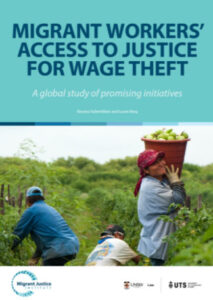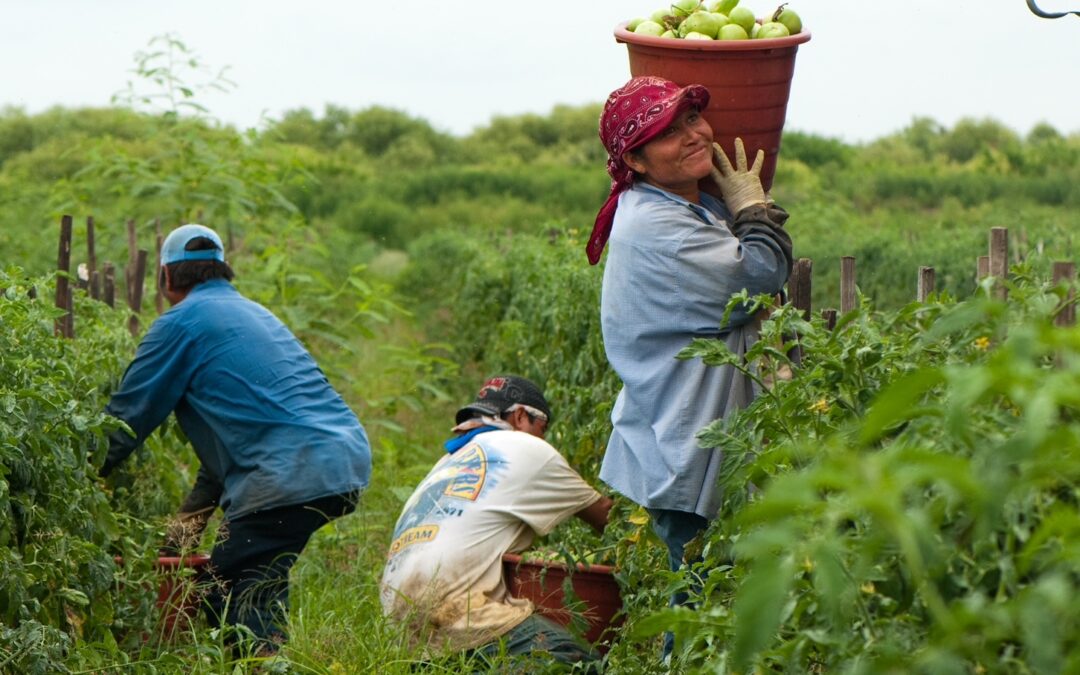Millions of workers around the world engage in paid labor—yet do not receive their wages. In addition, getting employers to pay workers what they are owed often is difficult—especially for those who have migrated for work, according to a new report from the Migrant Justice Institute.
“All of the risks and costs of wage recovery are placed with the party least able to bear them: the migrant worker,” says Laura Berg, co-executive director of the Migrant Justice Institute and co-author of the report, “Migrant Workers’ Access to Justice for Wage Theft.”
The report draws on a year of global consultations and analysis across all regions, identifying common drivers of wage theft to propose specific, practical reforms that can underpin global, national and local wage theft campaigns. It is co-authored by Migrant Justice Institute Co-Executive Director Bassina Farbenblum.
 Wage theft—which also includes being paid less than the minimum wage, or not being compensated for overtime or sick leave—increased during the COVID-19 pandemic, especially for migrant workers who were required to return to their home countries at the start of the pandemic and who then had no recourse for obtaining their unpaid wages.
Wage theft—which also includes being paid less than the minimum wage, or not being compensated for overtime or sick leave—increased during the COVID-19 pandemic, especially for migrant workers who were required to return to their home countries at the start of the pandemic and who then had no recourse for obtaining their unpaid wages.
But the magnitude of wage theft prior to the pandemic makes clear it happens by design.
“Wage theft is not just the result of a few bad employers. It’s part of a business model in many supply chains,” said Elizabeth Frantz at the Open Society Foundations. Frantz moderated a Migrant Justice Institute virtual panel December 7 to launch the report. (Watch the full event here.) OSF funded the report and virtual panel.
Speaking at the event, Jill Wells, with Engineers Against Poverty, described how a complex system of supply chain contracting in Qatar, where she worked on construction for the 2022 World Cup, often led to wage theft for migrant workers. Without laws and enforcement mechanisms to ensure migrant workers get compensated, even private organizations can only go so far to assist migrant workers, said Ben Harkins at the International Labor Organization (ILO), which has established Migrant Resource Centers in several Asian countries.
“Let’s be clear—this is not just a simple issue of wage arrears as many try to classify the issue, as if it’s just a clerical error. This is theft. And it’s outrageously common and getting worse during the pandemic,” said Solidarity Center Executive Director Shawna Bader-Blau, who took part in the panel. The Solidarity Center and the International Lawyers Assisting Workers (ILAW) network supported the report and organized the regional consultations.
Holding Employers Accountable, Expanding Labor Laws
A big barrier to accessing justice is migrant workers’ fear of employer retaliation. “Most migrant workers are unlikely to file a claim because they fear being deported, losing their job or other forms of retaliation,” the report says.
Although the report finds no single solution will ensure migrant workers receive their due compensation or can access justice if they do not, it details measures government officials and employers should take. For instance, migrant workers should receive permission to stay in country to pursue wage claims. If they return home without pay, they should be able to lodge wage claims through video testimony or online courts.
Because the system generally favors employers, migrant workers are forced to prove their claims, and it is extremely difficult for migrant workers to provide evidence of their work and the unpaid wages. The report recommends shifting the burden of proof to employers with legal presumptions in workers’ favor regarding duration of employment hours worked, wages owed and so on.
Holding employers accountable also is essential. “Employers facing a wage judgment simply liquidate or refuse to pay. They won’t be held responsible by suppliers or contractors,” said Berg. The report lists options for enforcing a determination and collecting payment, such as holding licensing of employers, deregistering a business and suspending orders until workers receive what they are owed.
Freedom to Form Unions Key to Migrant Worker Rights
Governments must extend labor law coverage to all workers, according to the report. Most migrant workers are not protected by labor laws, which establish minimum wages, job safety and health guidelines, and social protection coverage like paid sick leave and time off. And, most migrant workers are prohibited from forming unions to collectively champion decent working conditions.
The most marginalized workers are especially vulnerable to wage theft, and debt incurred when they are unpaid renders them vulnerable to forced labor, said Franz.
“This study focuses on initiatives by governments and state actors, but recognizes that often those mechanisms just aren’t enough,” said Bader-Blau. “To truly recover stolen wages and ensure migrant worker justice, this has to be combined with collective action of migrant workers around the world.”
Fundamentally, says Bader-Blau, “We must continue to support freedom of association, the right to organize and collectively bargain for all workers regardless of their nationality, sector or immigration status as the primary mechanism to prevent and address rampant wage theft of migrant workers.”
Says Frantz: “It’s clearly time for business and government to recognize that it is ethically unacceptable to let the risks and burdens of wage recovery lie with migrant workers rather than business and government.”
Panel participants also included Terri Gerstein from the Harvard Labor and Worklife program; Douglas Maclean, Justice Without Borders; and Apolinar Tolentino, Building and Wood Working International.
The report is part of an ongoing global campaign titled Justice for Wage Theft organized by Building and Wood Workers’ International (BWI), Migrant Forum in Asia, Lawyers Beyond Borders Network, Cross Regional Centre for Migrants and Refugees, South Asia Trade Union Council (SARTUC), ASEAN Services Employees Trade Union Council and the Solidarity Center.

